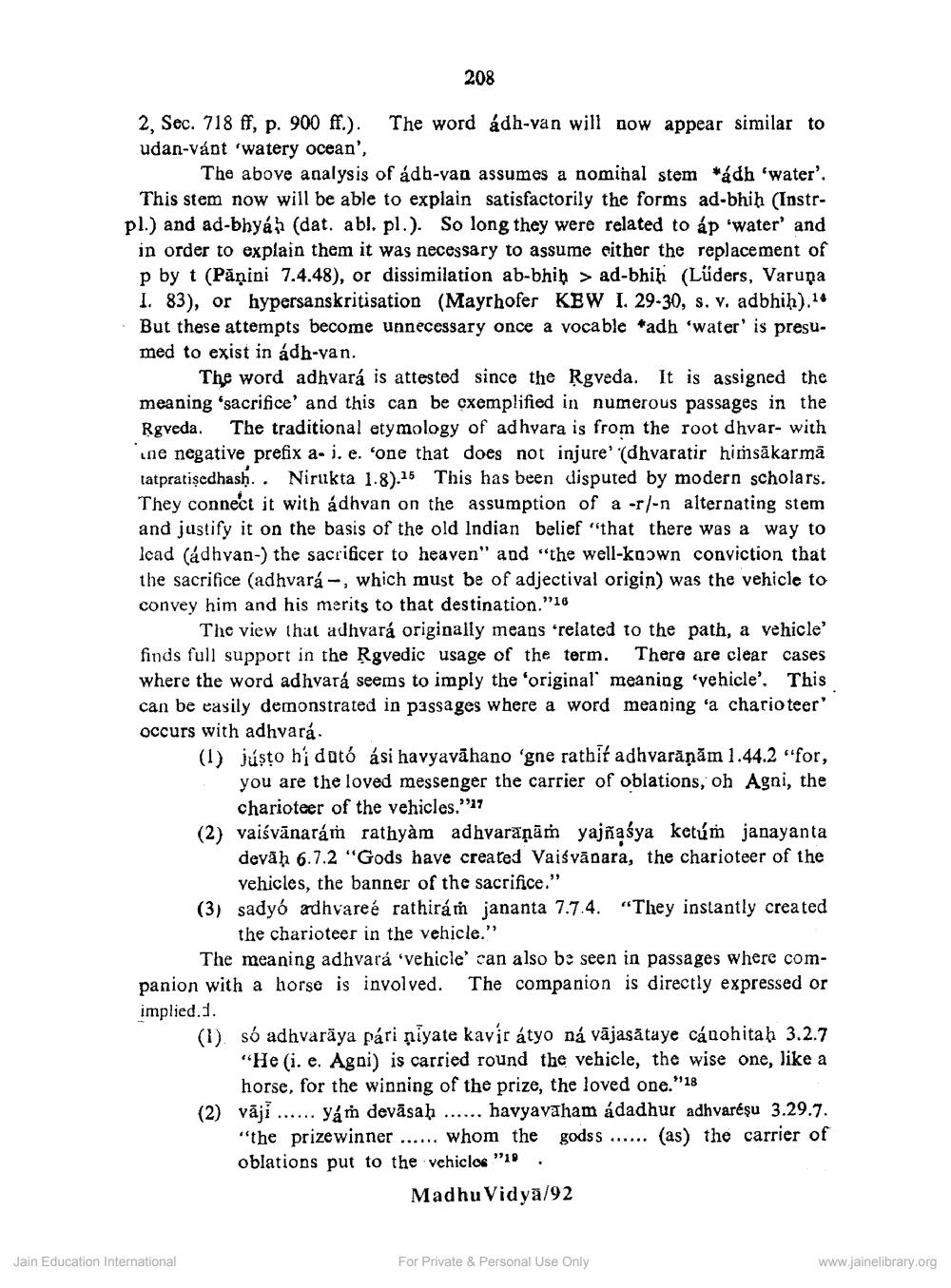________________
208
2, Sec. 718 ff, p. 900 ff.). The word ádh-van will now appear similar to udan-vánt 'watery ocean',
The above analysis of ádh-van assumes a nominal stem *ádh 'water'. This stem now will be able to explain satisfactorily the forms ad-bhih (Instrpl.) and ad-bhyah (dat. abl. pl.). So long they were related to áp 'water' and in order to explain them it was necessary to assume either the replacement of p by t (Pănini 7.4.48), or dissimilation ab-bhib> ad-bhib (Lüders, Varupa I. 83), or hypersanskritisation (Mayrhofer KBW I. 29-30, s. v. adbhih),14 But these attempts become unnecessary once a vocable *adh 'water' is presumed to exist in adh-van.
The word adhvará is attested since the Rgveda. It is assigned the meaning 'sacrifice' and this can be exemplified in numerous passages in the Rgveda. The traditional etymology of adhvara is from the root dhvar- with ne negative prefix a- i. e. 'one that does not injure' (dhvaratir himsäkarmä tatpratisedhash.. Nirukta 1.8).15 This has been disputed by modern scholars. They connect it with ádhvan on the assumption of a -r/-n alternating stem and justify it on the basis of the old Indian belief "that there was a way to lead (ádhvan-) the sacrificer to heaven" and "the well-known conviction that the sacrifice (adhvará-, which must be of adjectival origin) was the vehicle to convey him and his merits to that destination."16
The view that adhvará originally means 'related to the path, a vehicle' finds full support in the Rgvedic usage of the term. There are clear cases where the word adhvará seems to imply the 'original' meaning 'vehicle'. This can be easily demonstrated in passages where a word meaning 'a charioteer' occurs with adhvará.
Jain Education International
(1) jústo hi dutó ási havyavahano 'gne rathif adhvaraṇām 1.44.2 "for,
you are the loved messenger the carrier of oblations, oh Agni, the charioteer of the vehicles.""""
(2) vaiśvānarám rathyàm adhvaraṇāṁ yajñaśya ketúm janayanta devah 6.7.2 "Gods have created Vaisvanara, the charioteer of the vehicles, the banner of the sacrifice."
(3) sadyó adhvareé rathiráth jananta 7.7.4. "They instantly created the charioteer in the vehicle."
The meaning adhvará 'vehicle' can also be seen in passages where companion with a horse is involved. The companion is directly expressed or implied.1.
(1) só adhvaraya pári piyate kavir átyo ná vajasataye cánohitab 3.2.7 "He (i. e. Agni) is carried round the vehicle, the wise one, like a horse, for the winning of the prize, the loved one."
(2) vāji...... yám devāsaḥ havyavaham ádadhur adhvaréşu 3.29.7. "the prizewinner...... whom the godss (as) the carrier of oblations put to the vehicles "19.
Madhu Vidya/92
For Private & Personal Use Only
www.jainelibrary.org




